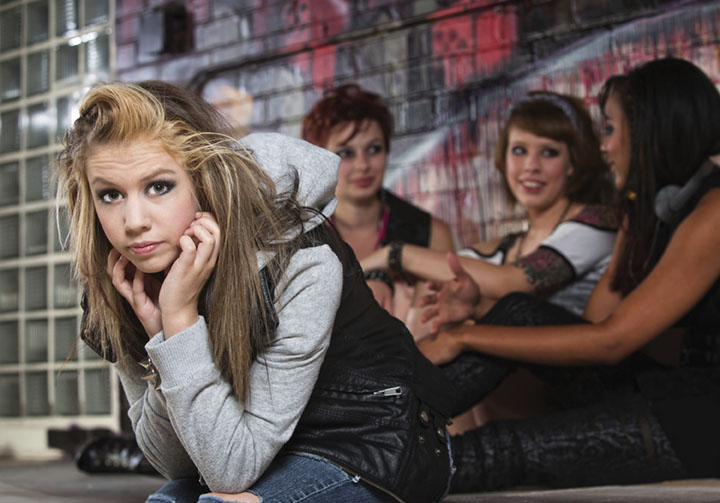A teenage boy is called names. He is pushed and made fun of by other kids regularly. Mean things are posted about him on social media sites. He has no friends. He’s being bullied. As awful as all this sounds, it is a fact of life for many young people today.
According to the Bureau of Justice Statistics and the National Center for Education Statistics Institute of Education Sciences 2013 report, 28 percent of students between the ages of 12 and 18 reported being bullied during the school year. That’s up 8 percent over a similar report from the Centers for Disease Control and Prevention (CDC), which was conducted in 2011.
The American Society for the Positive Care of Children (ASPCC) reports that kids who are at the most risk for being bullied are those who are lesbian, gay, bisexual, transgender (LGBT) or have a mental or physical disability.
Creating a Safe Space
Heather Wilkie, director for the Zebra Coalition, says bullying is definitely a problem that LGBT youth deal with more often than teens that do not identify as LGBT. “We find that LGBT kids and parents of LGBT kids don’t have enough information to really talk some of these issues out,” Wilkie says. “That’s where we come in. We are a nonprofit community resource and a safe space to learn how to deal with our differences as well as how to find a common ground.”
The Zebra Coalition began as a 24-hour hotline, which it still maintains, for LGBT youth about six years ago. Then it opened its doors in the Mills 50 area in 2013. The organization now has certified clinicians, administration, a volunteer coordinator and a case manager, and its mission is to foster hope for LGBT youth who are experiencing homelessness, bullying, abuse and isolation.
Suicide attempts for LGBT youth are four to six times greater than that of non-LGBT youth, the CDC reports. With the goal of saving lives, the Zebra Coalition and its staff of certified mental health counselors are uniquely qualified to bring anti-bullying education to Central Florida youth.
Currently, the Zebra Coalition has relationships with several area high schools to talk to kids about what bullying is in general. “We cover how to identify bullying and how to make sure you are not being bullied or bullying others,” Wilkie says. “We drill down to speak specifically to the issue of being bullied for being LGBT.”
While the issue of LGBT youth can be a hot-button topic, the Zebra Coalition’s educational program, at its core, is aimed at keeping bullying out of schools. “The next step is working to offer a follow up for kids, and even teachers, who need a safe place to talk about deeper issues that may arise from these discussions,” Wilkie says.
In-School Initiatives
Orange County Public Schools (OCPS) also has an anti-bullying initiative called SAFE, based on the work of renowned bullying expert, Dr. Dan Olweus. Luckily, OCPS has not seen significant incidences in bullying, says Mary Bridges, the senior director of the OCPS academic and guidance services department. But OCPS prefers to be proactive in its approach to bullying.
Anti-bullying campaigns began in OCPS schools in 2008 after anti-bulling legislation, referred to as the Jeffrey Johnston Stand Up for All Students Act, passed that required all school districts in Florida to develop an anti-bullying policy. Jeffery Johnston was a Coral Gables middle school student who committed suicide after being constantly bullied.
Bridges explains that the OCPS policy defines bullying (including cyber-bullying) as “systemically and chronically inflicting physical hurt or psychological distress.” It is further defined as “unwanted and repeated written, verbal or physical behavior including any threatening, insulting or dehumanizing gesture … to create an intimidating, hostile or offensive educational environment.” Cyber-bullying is doing any of these things through social media, email and other digital forms of communication.
Wilkie says cyber-bullying is a real threat but digital media is also a place many teens find support. “We reach out to the community through schools, community programs such as Stand Up Orlando and other initiatives, but we have found that social media is a great resource for support as well,” Wilkie says. “Our Facebook page and tweets are sometimes the first line of contact for kids who need our help.”
A City of Compassion
Orlando Mayor Buddy Dyer took up the anti-bullying cause with great passion beginning in 2014. According to Kathy DeVault, director of strategic partnerships for the city of Orlando, that is when Mayor Dyer’s Stand Up Orlando anti-bullying initiative began with financial support from local and national organizations such as Wal-Mart, Wayne Densch Charities and Fox 35.
“The mayor has always been dedicated to making Orlando a safe community for all our residents and visitors, and Stand Up Orlando is an extension of that,” DeVault says. “In addition to the anti-bullying policies in place in OCPS, we have partnered with both the Holocaust Memorial Resource and Education Center and the Zebra Coalition to bring anti-bullying curriculum into our schools.”
For its part, the Holocaust Memorial Resource and Education Center (HMREC) in Maitland serves as a historical educator to teach the community what extreme bullying can lead to if no one speaks out and stands up to bullies. Bailey Robb, the program coordinator for HMREC’s Upstanders initiative, says the program has reached more than 20,000 students throughout Central Florida.
Rooted in Holocaust education, UpStanders utilizes the stories of Holocaust rescuers to demonstrate what it means to stand up for those without a voice and speak out against prejudice and hatred. “Students are touched by the stories of rescue and troubled to learn that the majority of witnesses to the Holocaust did nothing to prevent the atrocity,” Robb says. “If more people would have spoken out against the racist sentiments of the Nazi party in the early years, perhaps the genocide could have been prevented.”
Those are sobering words for those who work in the community to eradicate bullying in all its forms. “We can only hope that with more awareness, education and public attention, we can make our community a safe place for everyone,” Wilkie says.
With help from teachers, students, nonprofit organizations and programs such as Upstanders and Stand Up Orlando, The City Beautiful is doing its part to put an end to bullying.
Signs a Child is Being Bullied
Look for changes in the child. However, be aware that not all children who are bullied exhibit warning signs. Some signs that may point to a bullying problem are:
• Unexplainable injuries
• Lost or destroyed clothing, books, electronics or jewelry
• Frequent headaches or stomach aches, feeling sick or faking illness
• Changes in eating habits, like suddenly skipping meals or binge eating. Kids may come home from school hungry because they did not eat lunch.
• Difficulty sleeping or frequent nightmares
• Declining grades, loss of interest in schoolwork, or not wanting to go to school
• Sudden loss of friends or avoidance of social situations
• Feelings of helplessness or decreased self-esteem
• Self-destructive behaviors such as running away from home, self harm or talking about suicide
If you know someone in serious distress or danger, don’t ignore the problem. Get help right away.
Signs a Child is Bullying Others
Kids may be bullying others if they:
• Get into physical or verbal fights
• Have friends who bully others
• Are increasingly aggressive
• Get sent to the principal’s office or to detention frequently
• Have unexplained extra money or new belongings
• Blame others for their problems
• Don’t accept responsibility for their actions
• Are competitive and worry about their reputation or popularity
Source: U.S. Department of Health & Human Services






Comments